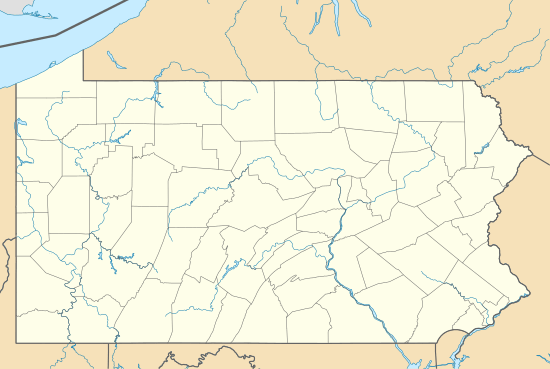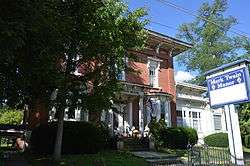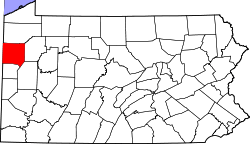Jamestown, Pennsylvania
| Jamestown | |
|---|---|
| Borough | |
|
The Gibson House, a historic site in the borough | |
| Nickname(s): Gateway to Pymatuning | |
 Location of Jamestown in Mercer County | |
 Jamestown Location of Jamestown within Pennsylvania | |
| Coordinates: 41°29′11″N 80°26′18″W / 41.48639°N 80.43833°WCoordinates: 41°29′11″N 80°26′18″W / 41.48639°N 80.43833°W | |
| Country | United States |
| State | Pennsylvania |
| County | Mercer |
| Founded | 1798 |
| Government | |
| • Mayor | Esther McClimans |
| Area | |
| • Total | 0.8 sq mi (2 km2) |
| Population (2000) | |
| • Total | 636 |
| • Density | 800/sq mi (310/km2) |
| Time zone | EST (UTC-4) |
| • Summer (DST) | EDT (UTC-5) |
| Zip code | 16134 |
| Area code(s) | 724 |
| School district | Jamestown School District |
Jamestown is a borough in Mercer County, Pennsylvania, United States, along the Shenango River. The population was 636 at the 2000 census. It is part of the Youngstown-Warren-Boardman, Ohio-PA Metropolitan Statistical Area.
History
The town was founded in 1798 by James Campbell. The borough was incorporated in 1853.
The Jamestown area is served by the Jamestown Area School District, and is home to Combined Systems Inc, a tactical weapons producer that exports tear gas and smoke grenades.[1]
The Gibson House was added to the National Register of Historic Places in 1978.[2]
Geography
Jamestown is located at 41°29′11″N 80°26′18″W / 41.48639°N 80.43833°W (41.486417, −80.438354).[3]
According to the United States Census Bureau, the borough has a total area of 0.8 square miles (2.1 km2), of which, 0.8 square miles (2.1 km2) of it is land and 1.27% is water.
Demographics
| Historical population | |||
|---|---|---|---|
| Census | Pop. | %± | |
| 1860 | 256 | — | |
| 1870 | 572 | 123.4% | |
| 1880 | 974 | 70.3% | |
| 1890 | 822 | −15.6% | |
| 1900 | 834 | 1.5% | |
| 1910 | 822 | −1.4% | |
| 1920 | 818 | −0.5% | |
| 1930 | 710 | −13.2% | |
| 1940 | 819 | 15.4% | |
| 1950 | 931 | 13.7% | |
| 1960 | 897 | −3.7% | |
| 1970 | 937 | 4.5% | |
| 1980 | 854 | −8.9% | |
| 1990 | 761 | −10.9% | |
| 2000 | 636 | −16.4% | |
| 2010 | 617 | −3.0% | |
| Est. 2015 | 595 | [4] | −3.6% |
| Sources:[5][6][7] | |||
As of the census[6] of 2000, there were 636 people, 269 households, and 171 families residing in the borough. The population density was 819.5 people per square mile (314.8/km2). There were 297 housing units at an average density of 382.7 per square mile (147.0/km2). The racial makeup of the borough was 99.53% White, and 0.47% from two or more races.
There were 269 households, out of which 26.8% had children under the age of 18 living with them, 50.9% were married couples living together, 9.7% had a female householder with no husband present, and 36.1% were non-families. 29.7% of all households were made up of individuals, and 15.6% had someone living alone who was 65 years of age or older. The average household size was 2.36 and the average family size was 2.97.
In the borough the population was spread out, with 24.8% under the age of 18, 8.2% from 18 to 24, 27.2% from 25 to 44, 24.7% from 45 to 64, and 15.1% who were 65 years of age or older. The median age was 38 years. For every 100 females there were 87.1 males. For every 100 females age 18 and over, there were 85.3 males.
The median income for a household in the borough was $26,979, and the median income for a family was $40,000. Males had a median income of $31,875 versus $17,917 for females. The per capita income for the borough was $15,199. About 11.6% of families and 15.8% of the population were below the poverty line, including 20.3% of those under age 18 and 3.4% of those age 65 or over.
References
- ↑ Chatterjee, Pratap (February 4, 2011). "Egypt's Military-industrial Complex". The Guardian. Guardian News and Media Ltd. Retrieved February 5, 2011.
- ↑ National Park Service (2010-07-09). "National Register Information System". National Register of Historic Places. National Park Service.
- ↑ "US Gazetteer files: 2010, 2000, and 1990". United States Census Bureau. 2011-02-12. Retrieved 2011-04-23.
- ↑ "Annual Estimates of the Resident Population for Incorporated Places: April 1, 2010 to July 1, 2015". Retrieved July 2, 2016.
- ↑ "Census of Population and Housing". U.S. Census Bureau. Retrieved 11 December 2013.
- 1 2 "American FactFinder". United States Census Bureau. Retrieved 2008-01-31.
- ↑ "Incorporated Places and Minor Civil Divisions Datasets: Subcounty Resident Population Estimates: April 1, 2010 to July 1, 2012". Population Estimates. U.S. Census Bureau. Retrieved 11 December 2013.

